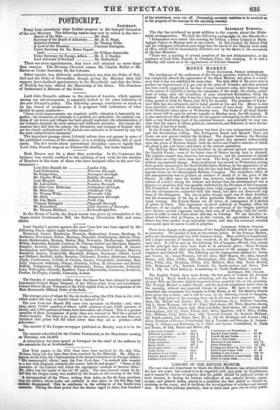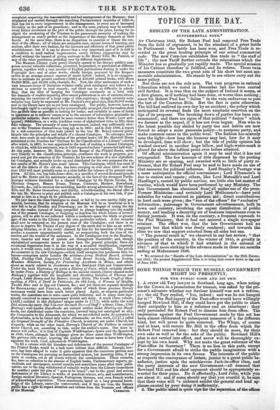LIBRARY OF THE BRITISH MUSEUM.
The vast size and importance to which the British Museum has attained within the last few years, has caused it to be regarded with just pride by Englishmen; and it cannot be matter of surprise that the public should be jealously awake to their interest, in having its various collections of art, natural history, manu- scripts, and printed books, placed in a condition the best suited to furnish in- struction to the many, and to facilitate the investigations of scholars and learned men. It was this jealousy precisely, that in times past gave use to every public
complaint respecting the inaccessibility and bad management of the Museum; that originated and carried through the searching Parliamentary inquiries of 1835-6; that has led to every improvement in the management, to every act of increased liberality on the part of its guardians; and to the same jealousy may be ascribed every future movement on the part of the public through the press, having for its object the awakening of the Trustees to the paramount necessity of making the management as nearly .perfect as the importance of the charge demands at their hands. At the same time, there is no disposition to question or blame the con- duct of the officers; all of whom are estimable men, sincere lovers of learning, and zealous, after their own fashion, for the interests and efficiency of that great public establishment: but if it can be shown that a very important part of it is still in a condition to need radical improvement, surely literary suggestions may be offered without the hazard of giving umbrage to Sir Henry Elba, Mr. Panizzi, or any of the other gentlemen presiding over its different departments. The Museum Library now pretty liberally opened to the literary public) com- prises several valuable collections, presented, bequeathed, or purchased at different periods, together with a vast number of English publications flowing in under the Copyright Act; and of other works, chiefly foreign, procured by the Keeper's orders at en average annual expense of about 8,0001.: indeed, it is no exaggera- tion to estimate its present contents (1846, ) at 350,000 printed books, with about 30,000 MSS., and 40,000 rolls, charters, &c. Now, the utter uselessness of such a vast treasure-house of literature without really good catalogues and indices is so obvious as scarcely to need remark; and there can be no difficulty in admit- ting, that the duty of keeping the Catalogue constantly on a level with the demands of readers inquiring after recent publications is one of extreme labour, requiring the exertions of a large corps of title-registrars; though certainly some surprise may fairly be at Mr. Penises own admission, that30,000 works now in the library have not as yet been catalogued. The public, however, have an indefeasible right to catalogues so far systematically arranged, that thereadera shall lose as little tune as posthble in looking for books; and certainly in cases of doubt or ignorance as to authors' names or as to the amount of information attainable on particular subjects, there should be some resource better than Watts's (now anti- quated) Bibliotheca, or a wide, trackless ocean of alphabetized titles in fifty-three folio volumes. The necessity of some improvement, indeed, was sufficiently obvi- ous to the Trustees themselves as long ago as in 1805; and in July 1806, a report by a sub-committee of that body (sided by the late Mr. Belo) entered pretty largely into the principles and details of a classed Catalogue. No attempts, how- ever, were made at any classification of the printed books, till Mr. Hartwell Home submitted to the Trustees his" Outlines for the Classification of a Library"; shortly after which, in 1825, be was appointed to the task of making a classed Catalogue, in which he, with his assistants, was in 1835 reported to have " proceeded half-way." At this point, however, Mr. Haber, the late Keeper of the Printed Books, never very friendly to the classification- rinciple, overthrew the work in progress, pro- posed and got the sanction of the for his own scheme of a new alphabeti- cal Catalogue, and actually broke up and distributed for his own purposes the en- tire results of Mr. Home's nine years' labour. This Catalogue, which has most if not all the defects of the old one, has been creeping on ever since 1834; and the year 1855 will most probably come to a close before the labours of its present com- pilers. All this, too, has been done—first, at a sacrifice of several thousand pounds paid to Mr. Home and his assistants; secondly, in the face of the strongest Parlia- mentary evidence furnished for a classed Catalogue by Sir Harris Nicolas, Dr. Olinthas Gregory, Messrs. Evans, Thorpe, Cochrane, Mathew, Bowerbank, Edwards, &c., not to mention the unwilling, hardly-wrung admissions of Sir Henry Ellis and Mr. Baber themselves; and thirdly, notwithstanding the liberal offer of the late Mr. Murray to print and publish such a Catalogue at his own risk, if pre- sented to him in a shape fit for publication. We now leave the class Catalogue to stand or fall by its own merits; fully per- suaded, however, that its adoption at the Museum will be as beneficial as it is now felt to be at, Dresden and Petersburg; nor ao we despair of seeing the day when the reader, instead of being compelled to plunge headlong into the muddy sea of the present Catalogue, or resigning as hopeless the whole labour of investi- gation, will be able to see collected within a moderate space the whole or greater part of the works in the Library on his own particular subject. A few remarks shall now be ventured on the present state of the Catalogue; and there is no desire to deprive Mr. Panizzi of any degree of the merit due to him as an active, obliging librarian, or of the credit claimed by him for his insertion of the press- marks; a measure unquestionably useful, as economizing both the time of the readers and the trouble of the assistants. In the Catalogues now in the Reading- room, disorder and want of system are throughout discernible; and, though alphabetical arrangement seems to have been the general principle, there are occasional departures from it in the way of a so-called classification, expressly made, it would seem, both to darken knowledge and excite risibility. The article ACADEMIES in the new Catalogue—which itself occupies two ponderous folio vo- luines—comprises under London the articles—Army Medical Board, Artisan Club, Etching Club, Engraver's Club, Grub Street Society, Merino Society, Museum Minerva: Society for Preventing Accidents in Mines, and others about as nearly related to Academies as the Beefsteak Club and Conservative. Under the head ifisrosus, we quote a History of Pews, which certainly should be under Pews; a History of Bishops in the ancient church, (better classed under Bishops,) together with the laughable and diverting histories of Thomas and Joseph, Little Henry and his Bearer, George Hicks, The Gentle Craft of Shoe- making, A Flirt, A Devil in Petticoats, An Old Lady, A Woman of Quality, Twelve Men sent to Spy out Canaan, &c.; and yet there are separate headings for BIOGRAPIIIA and Fsairm,u, under either of which these precious literary morceaux would have been much better placed. Again, as respects particular works, the insertions are in some cases quite ludicrous, and in many more inge- niously contrived to cause unnecessary trouble and delay. A small 12mo. volume, (1826,) entitled Is WE Religion? ranges under Is (!! I); while under the word Did, occurs the entry Did You ever See such D—d Stuff a Story, 12mo., 1760. Hurray's well-known Handbooks are entered neither under Murray nor Hand- books, but distributed under the countries, (several being not catalogued at all); the Companion to the Almanack, for which we are referred under ACADEMIES to Ephemerides, is to be found only under Almanacks ; an 8vo. work, (1717,) called An Original Draught of the Primitive Church, is entered, not under Church, but Enquiry; while on the other hand, Harvey's Church of the Fathers is entered under Church not according to rule, under the author's name. One more in- stance will suffice: it is that of Captain Widdrington's Spain and the Spaniards in 1843, where, although the titlepage gives no other name than Widdrisigton, the perverse title-writer, knowing t e author's former name to have been Cook,
the work, Cook, afterwards Widdrington.
to fill a volume with the blunders and deficiencies of the present Catalogue of the Printed Books, would be a task more tedious than difficult. Enough, how- ever, has been alleged to make it quite apparent that the numerous persons now on the Catalogues are pursuing no harmonized system, but inserting titles, if not quite at random, yet at all events without due consideration. These remarks, too, have no reference to the absence of English books, Parliamentary reports, pe- riodicals, and newspapers, several months and sometimes years after their publi- cation; nor to the long withdrawal of valuable works from the Library (sometimes for months) under the plea of " gone to be bound"; nor to the great and serious deficiencies of the Library in works of practical science, arts, and manufactures, foreign medical literature, Spanish, Portuguese, German, and even French works of acknowledged reputation. These statements, based on a long personal know- ledge of the Library, canne_be controverted; and if they are true, the literary public has a right to expect attention and redress from the Trustees and officers



























 Previous page
Previous page